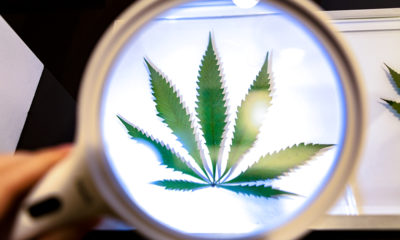Medical
A Gateway Out?
A survey of 404 medical cannabis patients in British Columbia has found that more than three quarters of the respondents report substituting cannabis for some other, more dangerous drug, according to an article published last week in Addiction Research and Theory. The study, which utilized anonymous surveys, found that over 40% of respondents used cannabis instead of alcohol, while 36% substituted marijuana for other illegal substances and nearly 68% used it instead of other prescription drugs. The two most commonly given reasons for the substitution were “less withdrawal” (67.7%) and “fewer side effects” (60.4%).
The findings are especially significant in the context of the ongoing debate over cannabis legalization. Many are concerned that legalization initiatives in Washington and Colorado will result in greater rates of consumption as those who have been holding off on trying the drug due to its illegality finally give it a shot. While it’s certainly plausible that usage rates among adults will go up in states which legalize coffee shops and/or package stores, this and other studies lend hope to optimists who nonetheless predict a better future for it. While marijuana is certainly not a harmless drug, the weight of the evidence clearly shows that it is significantly less addictive and dangerous than alcohol, cigarettes, or opiates like heroin or Oxycontin – thus, if an increase in cannabis use causes a corresponding decrease in the use of any of these more harmful drugs, the net effect may actually be good for society. If, as this latest research suggests, a very large proportion of cannabis users ingest the drug in lieu of alcohol or more dangerous street drugs, that in itself may constitute a powerful argument for even more cannabis legalization.
If only it were that simple. To fully determine whether legalization will have a net positive or net negative effect on public health, one must also consider how many people use cannabis not in substitution for but rather in conjunction with other drugs – there, the picture gets murkier. For example, copious research supports the conclusion that one of the benefits of medical marijuana is that it can potentiate the beneficial actions of opiates like Oxycontin, so that the user can get the same amount of pain relief by taking half as much Oxy. This reduces the risk of addiction and overdose, and is definitely a good thing. But the effects of cannabis in conjunction with alcohol (which is much more popular as than opiates) are less favorable, especially when it comes to getting behind the wheel. Whereas stoned driving is less bad than drunk driving, driving under the influence of both cannabis and alcohol can be worse than just driving drunk – demonstrating that just because cannabis substitution is overall a good thing doesn’t mean that the dangers of cannabis combination won’t outweigh its benefits.
All things considered, predicting the future remains a nebulous business. One thing is certain: many public health experts are closely watching Washington and Colorado, to see what happens.
























